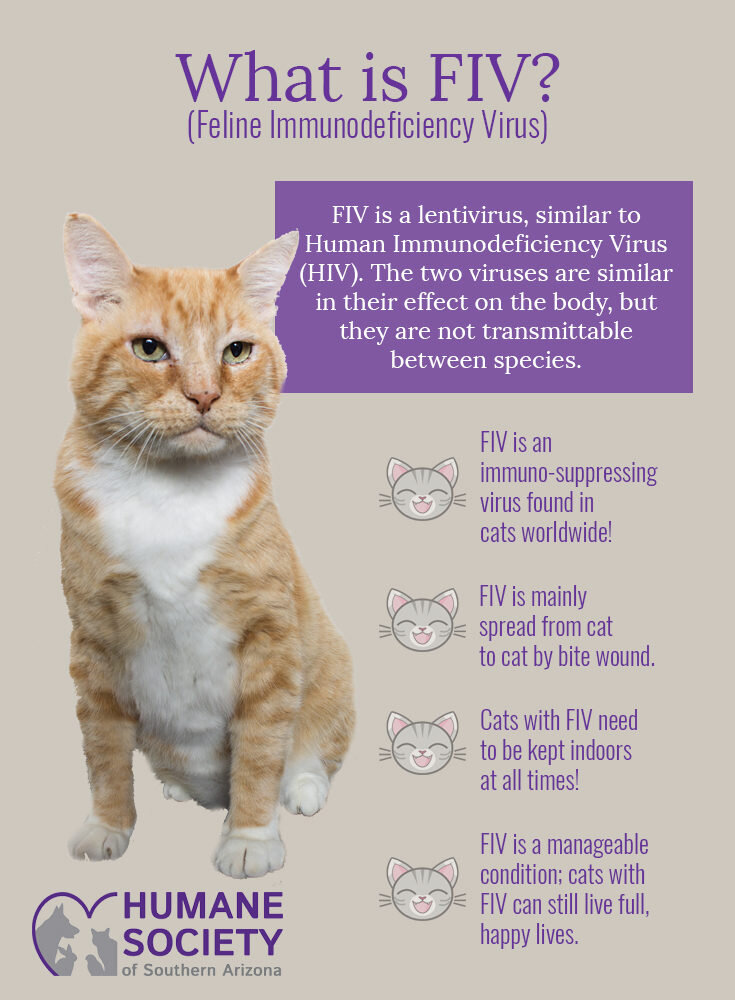FIV+ Cats
FIV+ cats are in our care and we realize that the foster process will be longer than most because so many of us know very little about FIV. We assume it’s a disease that is spread like wildfire. This is a misconception! We recognize we are not experts but we do choose to research a situation as much as possible, especially when something like this happens.
What is FIV?
Feline Immunodeficiency Virus (FIV) may not show symptoms until years after the initial infection. The virus is slow-acting, but the immune system of the cat will continue to be weak once the disease takes hold. This means the cat will be susceptible to various infections. However, this does not mean the cat needs to be euthanized. If the cat is provided with proper care, indoor cats can live comfortable lives for months to years before the disease is seen as chronic.
What are the symptoms?
Remember, an FIV+ cat may not show symptoms for many years. Once symptoms do develop, they may continually progress. A cat can show signs of FIV as well as other illnesses within their health for many years. Without proper treatment, the secondary infections that can occur as a consequence of FIV can progress to life-threatening conditions. Additionally, cats with FIV can develop various forms of cancer, blood diseases or kidney failure, which can claim the cat’s life. Please, see a veterinarian no matter the circumstances to complete a FIV test:
Enlarged lymph nodes
Fever
Anemia
Weight loss
Disheveled coat
Poor appetite
Diarrhea
Abnormal appearance or inflammation of the eye (conjunctivitis)
Inflammation of the gums (gingivitis)
Inflammation of the mouth (stomatitis)
Dental disease
Skin redness or hair loss
Wounds that don’t heal
Sneezing
Discharge from eyes or nose
Frequent urination, straining to urinate or urinating outside of litter box
Behavior change
How is FIV transmitted?
FIV will be passed from cat to cat through deep bite wounds. This is the single most common method of transfer. Think of an aggressive fight or territorial disputes that show battle wounds of another animal — that’s the type of deep bite wounds we’re talking about. This is a great reason to keep your cat inside. Another less common mode of transmission is from a FIV+ mother cat to her kittens. FIV does not seem to be commonly spread through sharing food bowls and litter boxes, social grooming, sneezing, and other casual modes of contact. It is extremely unlikely, if not impossible, for cats to get FIV from just being around infected cats or from a person touching a FIV-positive cat and then touching a FIV-negative cat. Although any cat is susceptible, free-roaming intact male outdoor cats who fight, frequently contact the disease. Please note: FIV cannot be transmitted from cat to human, only from cat to cat.
How is FIV diagnosed?
FIV Is routinely diagnosed by looking for antibodies of the virus in the blood through a blood test. Also note, no test is 100% accurate and the veterinarian will interpret the test result to decide if further testing is needed. Since mother cats can transfer the FIV antibodies to her kittens, the kittens will test positive from their mothers antibodies until they have cleared from their system. This can happen by six months of age. If a kitten is tested at a younger age than six months, they should undergo testing at a later date.
How is FIV treated?
There is no specific antiviral treatment for FIV. Cats can carry it for many years before the symptoms appear. Treatment will focus on extending the asymptomatic period or easing secondary effects of the virus. Medican can be subscribed for secondary infections and immune booster medication can be given, daily.
What does the care look like for an FIV+ cat?
Watch for changes, even minor changes, in behavior and report health concerns to a veterinarian. Bring the FIV+ cat the vet at least two times per year for a checkup, blood count, and urine testing. Feed your FIV+ cat a nutritionally balanced diet – no raw food (bacteria and other parasites can be dangerous to compromised immune systems). Always, always, always spay and neuter your pets. An FIV-positive cat can live with other FIV-negative cats if the cats are not considered fighters. FIV+ cats can live a long and healthy life if they are given the proper care.
Sources:
http://www.aspca.org/pet-care/cat-care/common-cat-diseases
http://bestfriends.org/resources/fiv-cats-faqs
Image Source: Human Society of Southern Arizona

